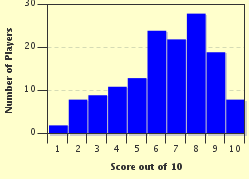Quiz Answer Key and Fun Facts
1. Which philosopher, whom Monty Python stated was 'a real pissant who was very rarely stable', published his major work "Critique of Pure Reason" in 1781?
2. According to Monty Python, this author of "Being and Time" was a 'boozy beggar who could think you under the table'. Who was he?
3. To which philosopher did Monty Python's malapropism 'I drink, therefore I am' refer?
4. In referring to a philosopher who, 'of his own free will, after half a pint of shandy was particularily ill', the Monty Python troupe alluded to his work "On Liberty". Who was this philosopher?
5. Monty Python's "Bruces' Philosophers Song" also touched on a few ancient Greek philosophers. Which of these did they NOT mention?
6. In Monty Python's fictional University of Woolloomooloo Philosophy Department, newcomer Michael Baldwin (new Bruce) was going to be teaching 'political science, Machiavelli, Bentham, Locke, Hobbes, Sutcliffe, Bradman, Lindwall, Miller, Hassett, and Benaud.' What did the Bruces call all of these philosophers?
7. In Monty Python's "Philosophers' Football Match" sketch, the opposing teams were comprised of philosophers from ancient Greece and 'modern' Germany. Which Chinese philosopher, known for his "Analects", acted as the referee?
8. The commentator for the "Philosophers' Football Match" described the tactics of the German manager as he 'has decided on all-out attack and indeed he must, with only two minutes of the match to go.' Who did Monty Python choose as the German manager, who in real life attacked the practices of the Catholic church through his "95 Theses on the Power and Efficacy of Indulgences"?
9. The "Philosophers' Football Match" remained goalless until the last minute, when the minds behind Monty Python had the Greek player Archimedes finally come to some internal conclusion, crying "Eureka!" and effecting (with Socrates and Herakleitos) the winning goal. This was a reference to Archimedes' discovery of the philosophical concept of 'arche' (what underlies all of reality).
10. In their 1983 film "The Meaning of Life", Monty Python had a couple briefly mention a philosopher (over dinner) who in real life went on record with an answer to the question, "What is the meaning of life?" Who was this philosopher, who answered that question by stating:
"One's life reflects one's will, and the will is an aimless, irrational, and painful drive. Salvation, deliverance, and escape from suffering are in aesthetic contemplation, sympathy for others, and asceticism."?
Source: Author
reedy
This quiz was reviewed by FunTrivia editor
bloomsby before going online.
Any errors found in FunTrivia content are routinely corrected through our feedback system.

